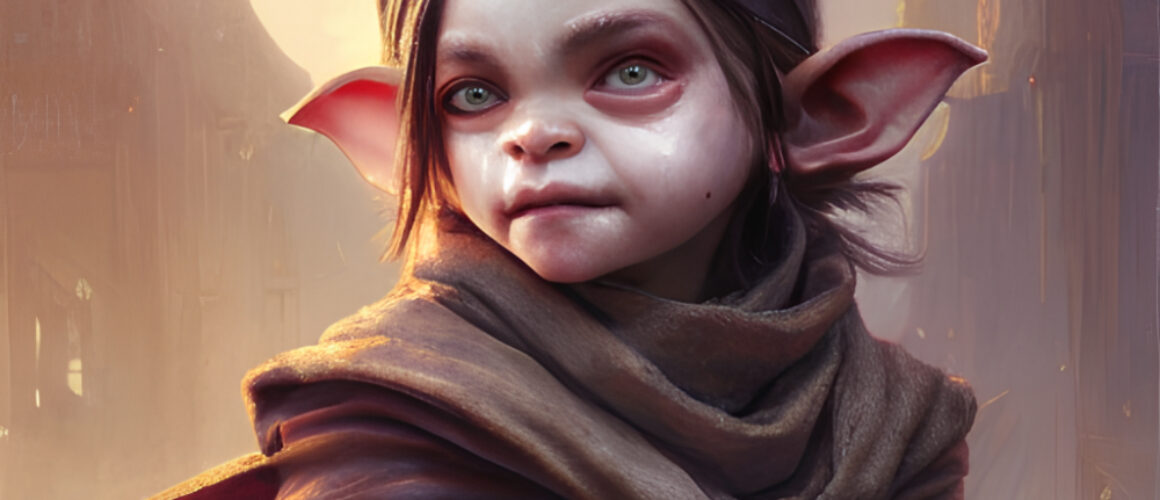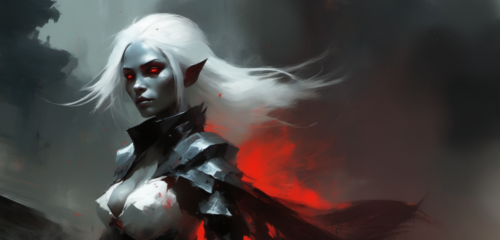The Adventure Generator (Updated for 2023)
In this guide, we will show you how to use our Adventure Generator for D&D and other fantasy roleplaying games. The adventure generator uses percentile tables to create a basic outline for an adventure. The player can then use this outline as a starter for a campaign or other important quest. The adventure generator uses seven tables to create the plot for your game.
These seven tables, when combined with the background lore of your setting, can provide many hours of adventuring for the solo player. These hooks can serve as inspiration when starting a game, or as a way to create other major quests. This tool can also be used alongside ChatGPT to help create text-based adventures. Our Solo DM Guide Part 3 – ChatGPT As Assistant AI Dungeon Master covers this method in detail.
The Adventure Generator is extremely useful and you can use it in many different ways. Need to do a favour for an NPC? Use the Adventure Generator to find out what they want from you. Looking for work because you’re low on funds? Use the Adventure Generator to find out what work is available.
What are Adventure Generators?
Adventure generators are tables that help you to create a random adventure. There are many tables like these online and feature often in OSR resources. If you want to have an idea for an adventure you simply throw a die and consult a table. Some players may already have an idea for an adventure before the session starts. This adventure idea can come from a film, book, or video game. In this case, an Adventure Generator isn’t necessary. Use your idea instead.
Adventure Type
The adventure generator uses four adventure types when generating a plot.

Caught up in events
The adventurers are caught up in events that are beyond their control. A character might be struck down by a curse or a party member might’ve seen something they shouldn’t have.
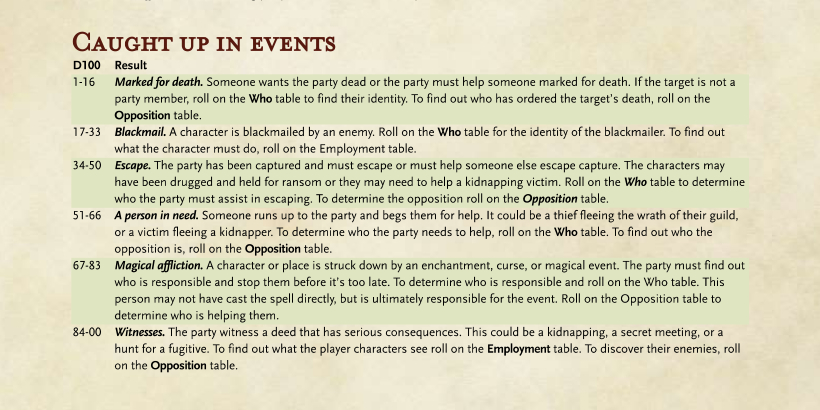
Employment
The characters are hired by an employer to do a job. They might have to look for a missing person, hunt down a dangerous creature, or mediate peace talks between rivals.

Exploration
The party needs to explore a location to achieve a goal. They might be looking for a lost treasure, a creature’s lair, or a place of mystical power.
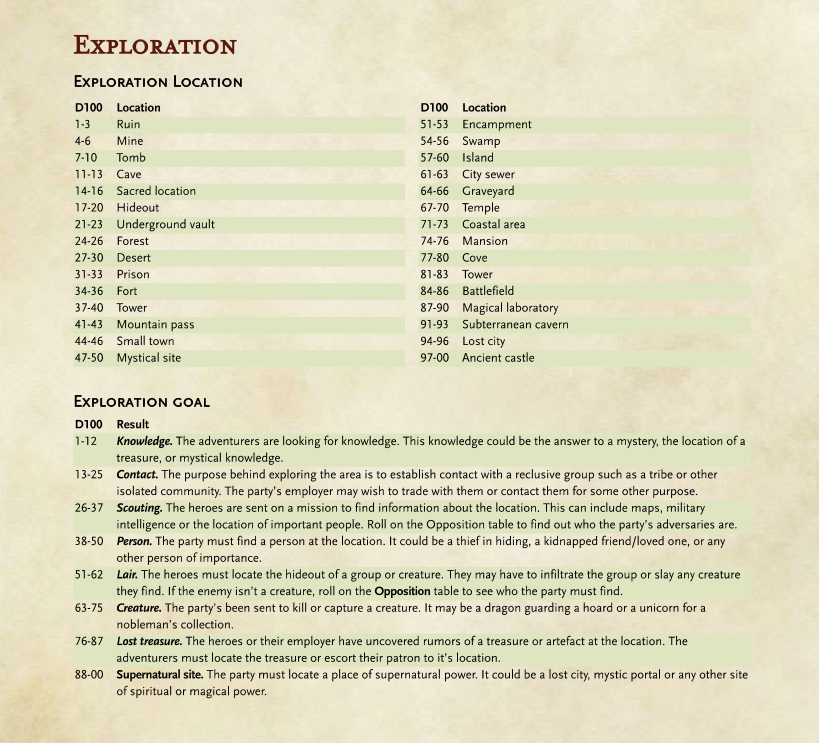
Civic affair
The adventurers are asked to help a community in need. This might involve overthrowing a tyrant, investigating a cult, or saving a town from disaster.
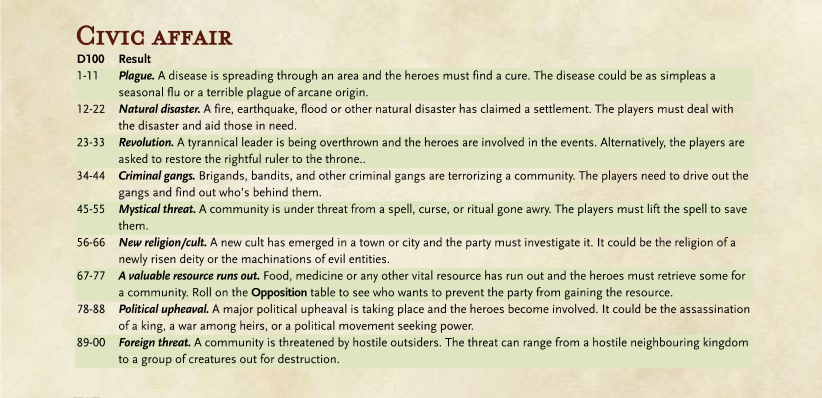
The Who table
The Who table details people who need help or are directly involved in the adventure. This table gives brief descriptions of non-player characters that can act as quest givers in a campaign. However, in certain adventures, the Who table can also be used to generate enemies that work against the player.
To discover how much power an individual wields within the campaign (such as nobles, government officials, and military members) roll a 1d6. A result of 1 indicates a weak or low-ranking member. A result of 6, on the other hand, indicates an extremely powerful individual, such as a king or general.
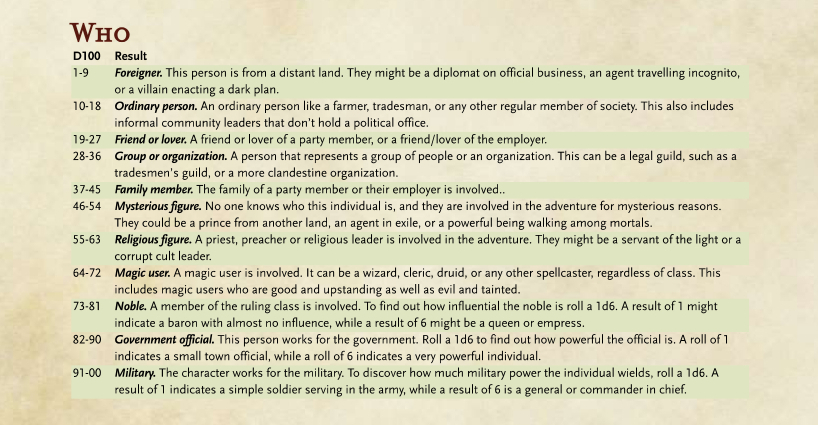
The Opposition table
The Opposition table contains enemies that oppose the adventurers in the campaign. These can range from powerful entities to organizations that want to prevent the party from reaching the quest objective.
Roll a 1d6 to discover your opposition’s power. A result of 1 indicates that a weak individual or group. However, a result of 6 indicates an extremely powerful enemy. How they oppose the adventuring party should be based on the campaign setting and the player’s personal preference.
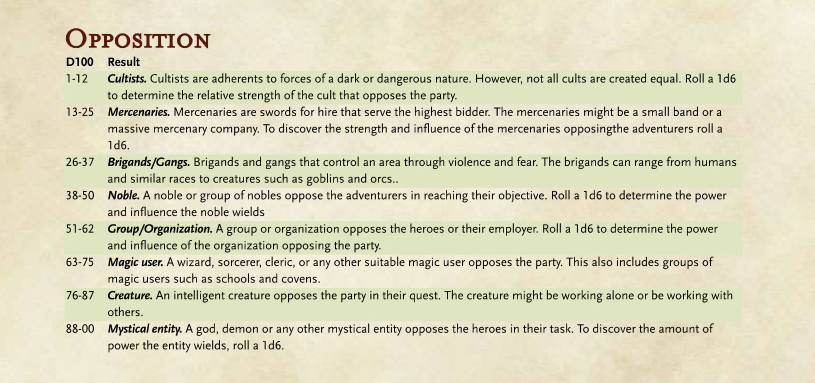
Using the adventure generator
The player can use the adventure in one of two ways. The first method involves rolling a d100 and consulting the various tables.
Begin by rolling a die or choose a quest type on the Adventure Type table. Then roll a d100 a second time and consult the tables detailing the adventure type. Exploration adventures have an Exploration Location and Exploration Goal table. These tables describe where the adventure takes place and why the adventurers are exploring that location.
If you need a quest giver, roll on the Who table. To find out who opposes or works against you during an adventure, roll on the Opposition table. Then roll a 1d6 to determine how powerful the opposition is that you’re facing. A result of 1 indicates a weak opponent, while 6 indicates en extremely powerful opponent.
Alternatively, instead of rolling on the various tables, the player can simply choose the options that appeal to them. If the player already has a quest giver in mind, then rolling on the Who table might not be necessary. Similarly, if the player already has a suitable enemy in their campaign, then rolling on the Opposition table might not be needed.
When you have the various plot elements, adapt them to your campaign setting’s lore and locations. Use these plot elements to create a basic synopsis for your adventure.
Example
Peter wants to create an adventure that takes place in the Forgotten Realms campaign setting. He decides to create an adventure for his party by rolling on the tables in the adventure generator.
On the Adventure Type table he rolls a 57. His party needs to explore an area. On the Exploration Location table he rolls a 98. The location is an ancient castle. To find out why his party is exploring this location, Peter rolls on the Exploration Goal table and gets 80. He needs to explore this castle to find a lost treasure.
Peter wants a quest giver for the adventure, so he decides to roll on the Who table to see who hired the party. Peter rolls 62, a religious figure needs his help. To find out how powerful this religious figure is, he rolls a 1d6 and gets a 4. The religious figure has some influence, but isn’t that powerful in their church.
To finish of the adventure outline, Peter rolls on the Opposition table to find out who opposes the party. He rolls 91. The party is opposed by a mystical entity. To discover how powerful this entity is, Peter rolls a 1d6 and gets 1, the entity is weak, but can still cause problems.
Peter decides that his party is hired by a Dawnmaster of Lathander to seek a lost artefact stolen by an imp. The imp is hiding in an ancient castle near the city of Baldur’s Gate.
Create side-quests with the legacy Adventure Generator
The legacy Adventure Generator is a part of the Solo Gaming Tool and uses a pack of playing cards to generate adventures. The legacy Adventure Generator is useful for creating quick side-quests during a game instead of at the start of the session. There are four categories of quests in the legacy version, one for each card suit: event-based (Spades), item-based (Hearts), NPC-based (Diamonds), and location-based (Clubs). The card suit determines the objective and focus of your quest.
Here are the oracles in the legacy Adventure Generator.
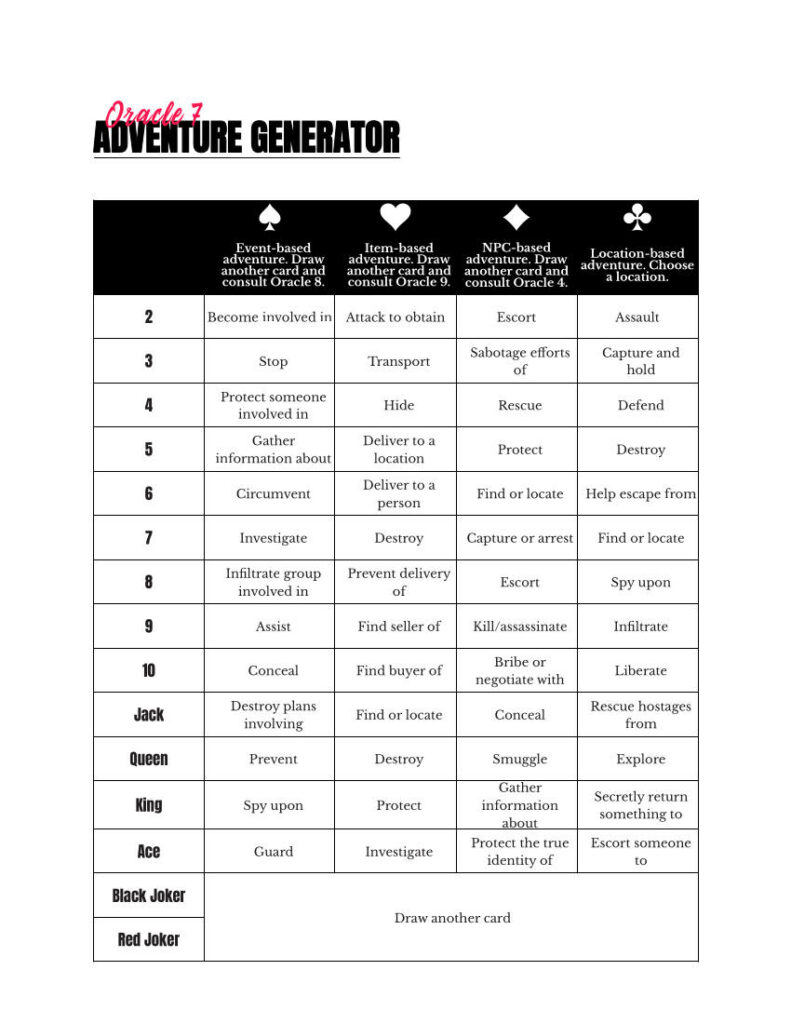
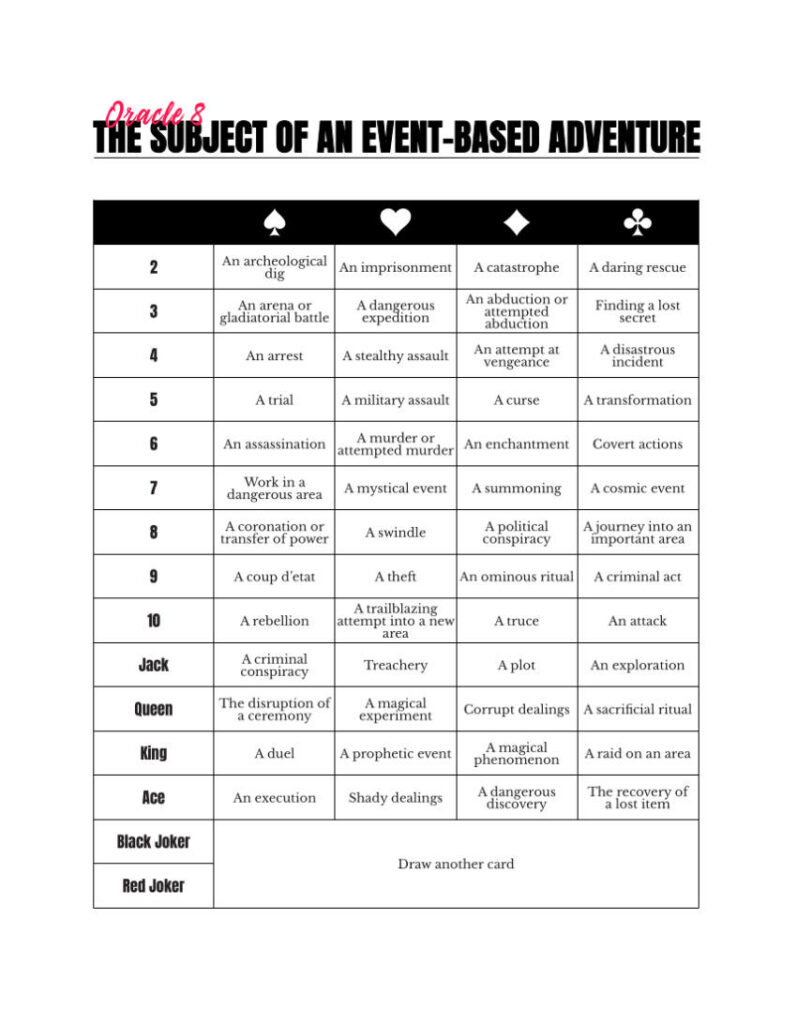
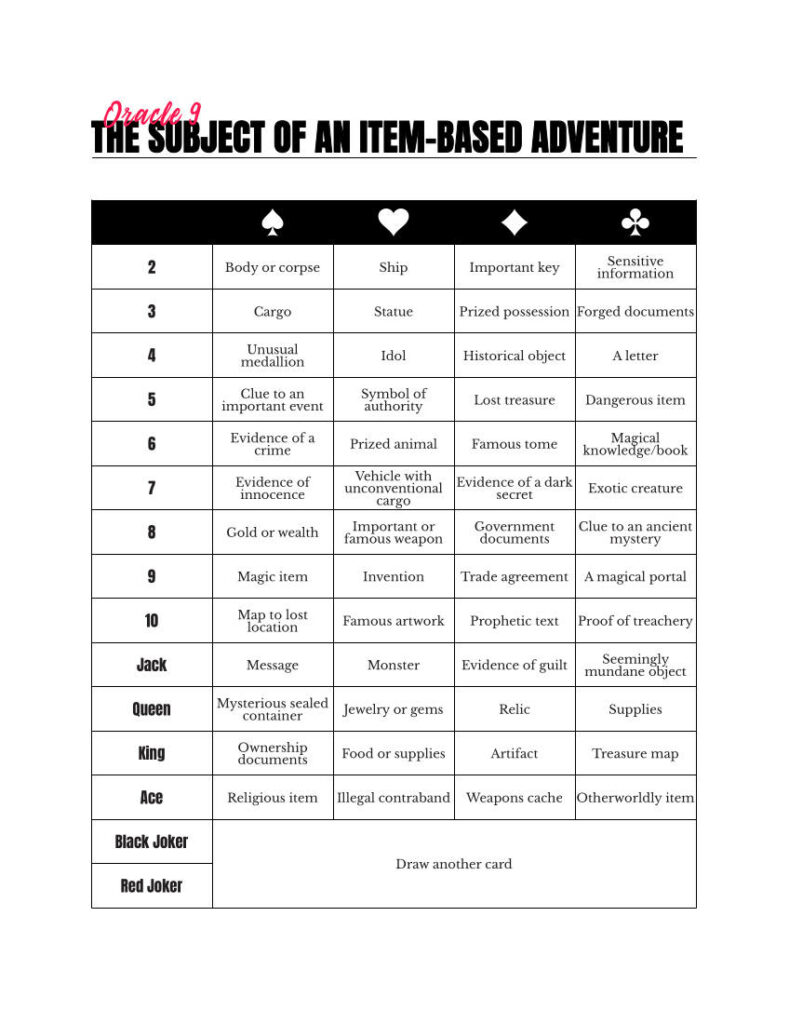
How to use the legacy Adventure Generator
To use this tool, draw a card, consult the oracle, and follow the instructions on the oracle.
For example, drawing a 4 of Spades gives the objective as “protect someone involved in …”.
To find out the second part, the subject of the adventure, follow the instructions listed under the suit. In our example, because we drew a Spade so we must draw another card and consult Oracle 8. Oracle 8 contains a list of possibilities. If we draw a 7 of Hearts it gives us “… a mystical event”.
Together the 4 of Spades and 7 of Hearts give us “protect someone involved in a mystical event”. You can use this short adventure hook any way you see fit in your campaign. You can use it as is and use other oracles to flesh it out, or you can use it as inspiration for coming up with your ideas.
Example:
You walk into a tavern and ask the innkeeper if he knows of anyone who has work for you. The Fate Roll says “yes, and …”. The innkeeper points you in the direction of a stranger sitting alone at a table. You ask them, “I hear you have work, what do you have to offer?”. To find out what your employer wants you to do, you decide to use the Adventure Generator.
You draw a 6 of Spades. Oracle 7 gives you “Circumvent… ”. The oracle instructs you to draw another card and consult Oracle 8. You draw a 5 of Spades. This gives you “… a trial.” Together they give you “circumvent a trial.”
The stranger tells you that he needs someone who can get their hands dirty. A friend of his has been arrested and he wants to break him out during his trial. Whether you accept the stranger’s offer or report it to the authorities is up to you.
Choosing locations for location-based adventures
The suit of Clubs refers to adventure objectives that involve locations. If you draw the 5 of Clubs, you are given “Destroy…” as an adventure objective. You are then instructed by the Oracle to choose a location.
Make a list of possible locations that you think would be suitable to destroy in your setting. You may have come across a bandit camp, a cult fortress, an infernal stronghold, etc. Roll a die to select which one you will attack and try to destroy. If you can think of only one suitable location, then choose that one.
Example:
You meet an agent in Waterdeep who has a task for you. To find out what she wants from you, you decide to use the Adventure Generator . You draw a 9 of Hearts which gives the objective as “Infiltrate …”.
Based on your setting you decide 4 possible locations would make sense: (1) A Zhentarim stronghold, (2) a Shadow Thieves hideout, (3) a corrupt merchant’s guild, and (4) an enclave of Red Wizards. As a result, you decide to roll a 1d4 to select the location. You roll a 2, the Shadow Thieves hideout.
You can interpret this as follows: the agent wants you to infiltrate a Shadow Thieves hideout in Waterdeep.
How to make the most of the Adventure Generator
Use these adventure hooks as inspiration, don’t follow them slavishly. If you come up with a better adventure hook, use that one instead. You are your own GM when playing solo or cooperatively. These rules and tools are intended to help you, not replace your judgment or creativity.
When you’re satisfied with your adventure hook write it down. It will provide context to your actions as well as a clear goal for your character to strive for. This will form the core of your story and can develop into an entire campaign. It will evolve in unpredictable ways and provide more inspiration for more adventures to come.

